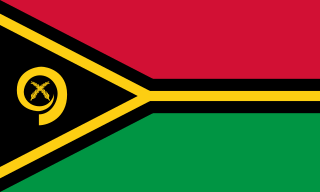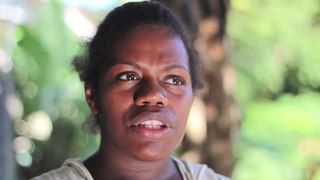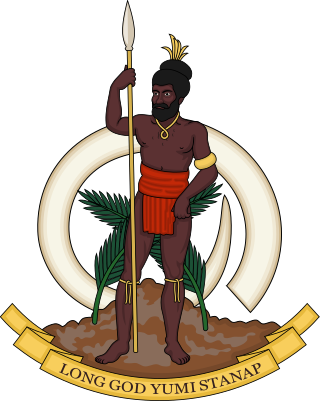Related Research Articles

Vanuatu, officially the Republic of Vanuatu, is an island country in Melanesia, located in the South Pacific Ocean. The archipelago, which is of volcanic origin, is 1,750 km (1,090 mi) east of northern Australia, 540 km (340 mi) northeast of New Caledonia, east of New Guinea, southeast of Solomon Islands, and west of Fiji.

Bislama is an English-based creole language and one of the official languages of Vanuatu. It is the first language of many of the "Urban ni-Vanuatu" and the second language of much of the rest of the country's residents. The lyrics of "Yumi, Yumi, Yumi", the country's national anthem, are composed in Bislama.

New Hebrides, officially the New Hebrides Condominium and named after the Hebrides Scottish archipelago, was the colonial name for the island group in the South Pacific Ocean that is now Vanuatu. Native people had inhabited the islands for three thousand years before the first Europeans arrived in 1606 from a Spanish expedition led by Portuguese navigator Pedro Fernandes de Queirós. The islands were named by Captain James Cook in 1774 and subsequently colonised by both the British and the French.

Ambae, also known as Aoba, Omba, Oba, or Opa and formerly Lepers’ Island, is an island in the South Pacific island nation of Vanuatu, located near 15°30′S167°30′E, approximately 310 kilometres north-northwest of Vanuatu's capital city, Port Vila. It is also Vanuatu's largest active volcano.

Ni-Vanuatu is a large group of closely related Melanesian ethnic groups native to the island country of Vanuatu. As such, Ni-Vanuatu are a mixed ethnolinguistic group with a shared ethnogenesis that speak a multitude of languages.

Kastom is a pidgin word used to refer to traditional culture, including religion, economics, art and magic in Melanesia.
Araki is a small rocky island with an area of 2.5 km², located 3 miles off the southern shores of Espiritu Santo, which is the largest island in the nation of Vanuatu.

Christianity is the largest religion in Vanuatu. Vanuatu is an archipelago made up of 13 larger islands, and approximately 70 smaller surrounding islands, each home to multitudes of diverse cultural and religious communities.

This article presents an overview of the culture of Vanuatu.
The North Vanuatu languages form a linkage of Southern Oceanic languages spoken in northern Vanuatu.
The literature of Vanuatu, understood in the strict sense of written literature, began in the 1960s.

The Constitution of Vanuatu is the supreme law of the Republic of Vanuatu. It was enacted in 1979, and came into force upon the country's independence on 30 July 1980.

The Land and Justice Party is a traditionalist, pro-indigenous and pro-youth political party in Vanuatu. The party was launched on 11 November 2010 and is led by MP Ralph Regenvanu.
Law in the Republic of Vanuatu consists of a mixed system combining the legacy of English common law, French civil law and indigenous customary law. The Parliament of Vanuatu is the primary law-making body today, but pre-independence French and British statutes, English common law principles and indigenous custom all enjoy constitutional and judicial recognition to some extent.
Ni-Vanuatu names are the names used by the people of Vanuatu, who are commonly known as ni-Vanuatu. Under the law of Vanuatu, a child's name registered at birth should include "the family name, the Christian name, if any, and the Melanesian individual name", the latter of which is also known as a "traditional name" or "custom name".

Manaro Voui, or Manaro Vui, is a shield volcano whose emergent portion is known as the island of Ambae in Vanuatu. The summit is 1,496 metres (4,908 ft) above sea level and about 3,900 m (12,800 ft) above the sea floor. According to indigenous custom Chief Virenaliu Paul Vuhu, the summit's valley and lakes are considered `the "sacred place and paradise" where they believe after death, their spirits go to live happily ever after'. Vanuatu Meteorology and Geohazards Department maintains a live webcam and seismological chart.

The Iauko Group or Eagle Group is a political party in Vanuatu.

Stephen Seymour James Andrew is an Australian politician. He has been the One Nation member for Mirani in the Queensland Legislative Assembly since 2017.
Nadia Kanegai is a social entrepreneur, politician and historian from Vanuatu. She made the first study of women's traditional tattooing on Ambae. She has stood as a candidate in three elections in Vanuatu and was a prominent community activist during the 2017 and 2018 eruptions of Manaro Voui.
The Narave or Naravé pig is a type of domestic pig native to northern Vanuatu. Narave pigs are pseudohermaphrodite (intersex) male individuals that are kept for ceremonial purposes.
References
- ↑ Terry Crowley (2003). A new Bislama dictionary (2nd ed.). University of the South Pacific. p. 185. ISBN 982-02-0362-7.
- ↑ Gray, Andrew. 2013. The Languages of Pentecost Island. British Friends of Vanuatu Society.